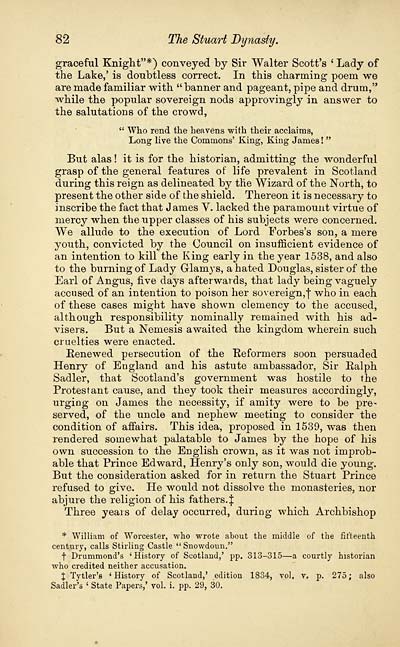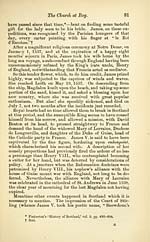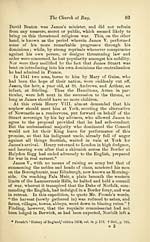Stuart dynasty
(102) Page 82
Download files
Complete book:
Individual page:
Thumbnail gallery: Grid view | List view

82 The Stuart Dynasty.
graceful Knight"*) conveyed by Sir Walter Scott's ' Lady of
the Lake,' is doubtless correct. In this charming poem we
are made familiar with " banner and pageant, pipe and drum,"
while the popular sovereign nods approvingly in answer to
the salutations of the crowd,
" Who rend the heavens with their acclaims,
Long live the Commons' King, King James ! "
But alas ! it is for the historian, admitting the wonderful
grasp of the general features of life prevalent in Scotland
during this reign as delineated by the Wizard of the North, to
present the other side of the shield. Thereon it is necessary to
inscribe the fact that James V. lacked the paramount virtue of
mercy when the upper classes of his subjects were concerned.
We allude to the execution of Lord Forbes's son, a mere
youth, convicted by the Council on insufficient evidence of
an intention to kill the King early in the year 1538, and also
to the burning of Lady Glamys, a hated Douglas, sister of the
Earl of Angus, five days afterwards, that lady being vaguely
accused of an intention to poison her sovereign,! who in each
of these cases might have shown clemency to the accused,
although responsibility nominally remained with his ad-
visers. But a Nemesis awaited the kingdom wherein such
cruelties were enacted.
Benewed persecution of the Beformers soon persuaded
Henry of England and his astute ambassador, Sir Balph
Sadler, that Scotland's government was hostile to the
Brotestant cause, and they took their measures accordingly,
urging on James the necessity, if amity were to be pre-
served, of the uncle and nephew meeting to consider the
condition of affairs. This idea, proposed in 1539, was then
rendered somewhat palatable to James by the hope of his
own succession to the English crown, as it was not improb-
able that Brince Edward, Henry's only son, would die young.
But the consideration asked for in return the Stuart Brince
refused to give. He would not dissolve the monasteries, nor
abjure the religion of his fathers. f
Three years of delay occurred, during which Archbishop
* William of Worcester, who wrote about the middle of the fifteenth
century, calls Stirling Castle " Snowdoun."
f Drummond's 'History of Scotland,' pp. 313-315 — a courtly historian
who credited neither accusation.
% Tytler's ' History of Scotland,' edition 1834, vol. v. p. 275 ; also
Sadler's ' State Papers,' vol. i. pp. 29, 30.
graceful Knight"*) conveyed by Sir Walter Scott's ' Lady of
the Lake,' is doubtless correct. In this charming poem we
are made familiar with " banner and pageant, pipe and drum,"
while the popular sovereign nods approvingly in answer to
the salutations of the crowd,
" Who rend the heavens with their acclaims,
Long live the Commons' King, King James ! "
But alas ! it is for the historian, admitting the wonderful
grasp of the general features of life prevalent in Scotland
during this reign as delineated by the Wizard of the North, to
present the other side of the shield. Thereon it is necessary to
inscribe the fact that James V. lacked the paramount virtue of
mercy when the upper classes of his subjects were concerned.
We allude to the execution of Lord Forbes's son, a mere
youth, convicted by the Council on insufficient evidence of
an intention to kill the King early in the year 1538, and also
to the burning of Lady Glamys, a hated Douglas, sister of the
Earl of Angus, five days afterwards, that lady being vaguely
accused of an intention to poison her sovereign,! who in each
of these cases might have shown clemency to the accused,
although responsibility nominally remained with his ad-
visers. But a Nemesis awaited the kingdom wherein such
cruelties were enacted.
Benewed persecution of the Beformers soon persuaded
Henry of England and his astute ambassador, Sir Balph
Sadler, that Scotland's government was hostile to the
Brotestant cause, and they took their measures accordingly,
urging on James the necessity, if amity were to be pre-
served, of the uncle and nephew meeting to consider the
condition of affairs. This idea, proposed in 1539, was then
rendered somewhat palatable to James by the hope of his
own succession to the English crown, as it was not improb-
able that Brince Edward, Henry's only son, would die young.
But the consideration asked for in return the Stuart Brince
refused to give. He would not dissolve the monasteries, nor
abjure the religion of his fathers. f
Three years of delay occurred, during which Archbishop
* William of Worcester, who wrote about the middle of the fifteenth
century, calls Stirling Castle " Snowdoun."
f Drummond's 'History of Scotland,' pp. 313-315 — a courtly historian
who credited neither accusation.
% Tytler's ' History of Scotland,' edition 1834, vol. v. p. 275 ; also
Sadler's ' State Papers,' vol. i. pp. 29, 30.
Set display mode to:
![]() Universal Viewer |
Universal Viewer | ![]() Mirador |
Large image | Transcription
Mirador |
Large image | Transcription
Images and transcriptions on this page, including medium image downloads, may be used under the Creative Commons Attribution 4.0 International Licence unless otherwise stated. ![]()
| Histories of Scottish families > Stuart dynasty > (102) Page 82 |
|---|
| Permanent URL | https://digital.nls.uk/94818990 |
|---|
| Description | A selection of almost 400 printed items relating to the history of Scottish families, mostly dating from the 19th and early 20th centuries. Includes memoirs, genealogies and clan histories, with a few produced by emigrant families. The earliest family history goes back to AD 916. |
|---|

